 June 2019
June 2019
Rent controls were extended to include all rental properties in June 2017. This made all condo owner-landlords subject to the Residential Tenancies Act thus requiring them to follow the same rules as those previously applied to pre-1991 rental properties.
The Residential Tenancies Act encompasses much more than rent controls. It is intended to govern the conduct of landlords and tenants with respect to each other. Created during a different time, the Act generally governs housing not provided by private individuals.
Residential Tenancies Act rules have inadvertently contributed to today’s high cost of rental accommodation. Failing to recognize today’s realities may have created a more difficult situation for condo resident-tenants.
The Landlord and Tenant Board is intended to adjudicate landlord-tenant disputes without the need for legal counsel. They present themselves as fair, patient and impartial. They adhere to rules in the Residential Tenancies Act which appear more suited to public housing than condo living with condo owners serving as landlords. As the selling prices of condo properties have skyrocketed, landlords are in a stronger financial position to obtain legal expertise allowing them to take advantage of these rules.
The Residential Tenancies Act requires landlords to provide 60 days advance notice when terminating a lease. Today, 90 days can be necessary to find new rental accommodation. Allowing time for a current tenant to depart and a unit made available for new tenancy can require an additional 45 days. Thus, legal termination of a tenancy of less than 120 days places tenants at risk of homelessness which partially explains how condo-landlords are able to charge upwards of 30 per cent more for a rental.
N11 Misuse
Condo-landlords are increasingly looking to sell properties at maximum selling price. It is in their interest to sell quickly without allowing tenants to benefit from protections available to them. This involves misuse of the official N11 form tenants are asked to sign. TheN11 is how many condo-landlords inform tenants their lease is being terminated.
 The Residential Tenancies Act requires any new owner of a condo with a current tenant to take over the lease. Once the sale is complete, the new landlord is expected to inform the tenant if they intend to end the tenancy with 60 days advance notice. A tenant unable to find suitable accommodation can file application with the Landlord and Tenant Board to request an extension which can extend the tenancy for multiple months.
The Residential Tenancies Act requires any new owner of a condo with a current tenant to take over the lease. Once the sale is complete, the new landlord is expected to inform the tenant if they intend to end the tenancy with 60 days advance notice. A tenant unable to find suitable accommodation can file application with the Landlord and Tenant Board to request an extension which can extend the tenancy for multiple months.
This is an undesirable situation for any condo-landlord seeking to sell their property so efforts are made to work around the regulations.
Most tenants, upon receiving a notice informing of a lease termination date, will seek alternate accommodation regardless of cost. The risk of homelessness is greater, to them, than the risk of having to pay an additional 30 percent or more in rent for comparable accommodation. They are unfamiliar with tenant rights and condo-landlords have learned to capitalize on this.
When a condo is sold, only the new condo-landlord can evict a tenant but only under certain circumstances which include the new owner moving into the unit. A signed N11 absolves a new condo owner from complying with limitations on eviction and helps facilitate a faster condo sale at a higher price. Most tenants are unaware of this. A condo-landlord may provide the tenant with an N11, including tenancy end date, before the property is sold. Once signed by a tenant, their right to remain in a rental property is lost.
The Residential Tenancies Act provides additional protections. When showing a unit to a prospective buyer, a condo-landlord is required to provide proper notice of at least 24 hours. A tenant can refuse access to their unit without proper notice. They can place reasonable restrictions on access – such as limiting access hours to times convenient to them. They can disallow photographs to be taken of personal items. These protections are not enforceable upon real estate agents and prospective buyers. The condo-landlord has no obligation to enforce these protections, which are problematic to selling a condo property. The Landlord and Tenant Board advises that enforcing these protections can make the tenant legally liable for interfering with a sale thus discourages tenants from asserting these rights. It comes as no surprise when tenants fear enforcing their rights and are subjected to harassment.
A condo-landlord providing false assurance they have the right to end a tenancy, by providing a N11, is not in compliance with the Residential Tenancies Act. This false assertion comes with no repercussions despite being used to trick tenants into acting against their best interest. It is the position of the Landlord and Tenant Board that the tenant should be aware the assertion is false and simply ignore it so as to “retain all their rights and obligations” and allow the purchaser to “assume” the tenancy.
Ruling that a tenant is “free to ignore the Landlord’s demands” after receiving improper notice to end a tenancy presumes a legal understanding of these documents that does not generally exist in the current condo rental marketplace. A Landlord and Tenant Board ruling that a tenant could simply ignore a condo-landlord’s demand to end a tenancy places the tenant at risk of homelessness should the Landlord and Tenant Board choose not to extend a tenancy.
Rental-only buildings of comparable quality to condo buildings may be the best solution for those who desire a luxury condo lifestyle without the abuses currently inflicted by some condo-landlords.
 Actions presented here were the subject of a Landlord and Tenant Board hearing in May 2018. The condo-landlord successfully sold their unit for over $1 million while forcing the tenant to incur more than $20,000 in additional rental costs.
Actions presented here were the subject of a Landlord and Tenant Board hearing in May 2018. The condo-landlord successfully sold their unit for over $1 million while forcing the tenant to incur more than $20,000 in additional rental costs.



